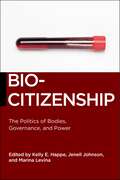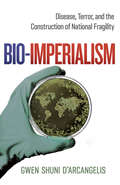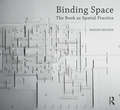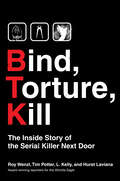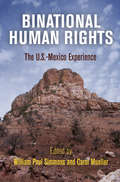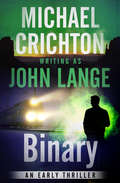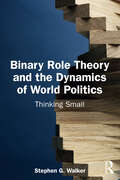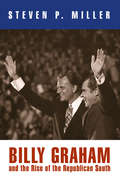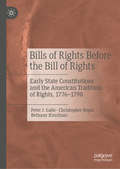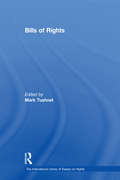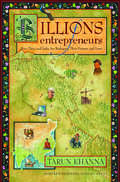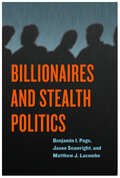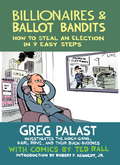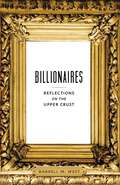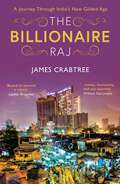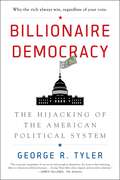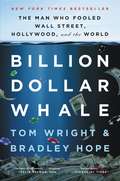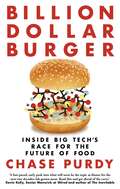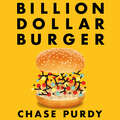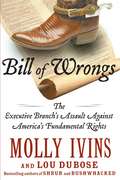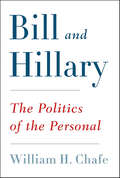- Table View
- List View
Biocitizenship: The Politics of Bodies, Governance, and Power (Biopolitics #19)
by Kelly E. Happe Jenell Johnson Marina LevinaA groundbreaking exploration of biocitizenshipCitizenship has a long, complex relationship with the body. In recent years, developments in biomedicine and biotechnology, as well as a number of political initiatives, grassroots efforts, and public policies have given rise to new ways in which bodies shape the idea and practices of citizenship, or what has been called “biocitizenship.” This book, the first collection of essays on the topic of biocitizenship, aims to examine biocitizenship as a mode of political action and expand readers’ understanding of biopolitics. Organized into four distinct sections covering topics including AIDS, drug testing on the mentally ill, and force-feeding prisoners, Biocitizenship delves deep into the relationship between private and public identity, politics, and power. Composed of pieces by leading scholars from a wide variety of disciplines, Biocitizenship offers a clear and comprehensive discussion on biocitizenship, biopolitics, and groups that may be affected by this ever-growing dialogue. Authors address issues familiar to biopolitics scholarship such as gender, sexuality, class, race, and immigration, but also consider unique objects of study, such as incubators, dead bodies, and corporations. Biocitizenship seeks to question who may count as a biological citizen and for what reasons, an essential topic in an age in which the body and its health provide the conditions necessary for political recognition and agency.
Bio-Imperialism: Disease, Terror, and the Construction of National Fragility
by Gwen Shuni D'ArcangelisBio-Imperialism focuses on an understudied dimension of the war on terror: the fight against bioterrorism. This component of the war enlisted the biosciences and public health fields to build up the U.S. biodefense industry and U.S. global disease control. The book argues that U.S. imperial ambitions drove these shifts in focus, aided by gendered and racialized discourses on terrorism, disease, and science. These narratives helped rationalize American research expansion into dangerous germs and bioweapons in the name of biodefense and bolstered the U.S. rationale for increased interference in the disease control decisions of Global South nations. Bio-Imperialism is a sobering look at how the war on terror impacted the world in ways that we are only just starting to grapple with.
Binding Their Wounds: America's Assault on Its Veterans
by Robert J. Topmiller T. Kirby NeillThe victims of US military campaigns are usually nameless civilians in far away places, but there are also victims closer to home - the soldiers so often used and then discarded by the establishment. Binding Their Wounds is a book about US veterans written by a US veteran - Bob 'Doc' Topmiller. Topmiller fought in Vietnam, founded a school for orphans there, and become a professor of history before he tragically committed suicide. Close friend and scholar Kerby Neill stepped in to complete the book. The result is a history of US veterans and their treatment by the US establishment from the early republic to the recent wars in Iraq and Afghanistan. Binding Their Wounds offers policy recommendations to improve post-conflict treatment and care for veterans which are long overdue.
Binding Space: The Book as Spatial Practice (Design Research in Architecture)
by Marian MackenBooks orient, intrigue, provoke and direct the reader while editing, interpreting, encapsulating, constructing and revealing architectural representation. Binding Space: The Book as Spatial Practice explores the role of the book form within the realm of architectural representation. It proposes the book itself as another three-dimensional, complementary architectural representation with a generational and propositional role within the design process. Artists’ books in particular – that is, a book made as an original work of art, with an artist, designer or architect as author – have certain qualities and characteristics, quite different from the conventional presentation and documentation of architecture. Paginal sequentiality, the structure and objecthood of the book, and the act of reading create possibilities for the book as a site for architectural imagining and discourse. In this way, the form of the book affects how the architectural work is conceived, constructed and read. In five main sections, Binding Space examines the relationships between the drawing, the building and the book. It proposes thinking through the book as a form of spatial practice, one in which the book is cast as object, outcome, process and tool. Through the book, we read spatial practice anew.
Bind, Torture, Kill: The Inside Story of BTK, the Serial Killer Next Door
by L. Kelly Roy Wenzl Tim Potter Hurst LavianaFor thirty-one years, a monster terrorized the residents of Wichita, Kansas. A bloodthirsty serial killer, self-named "BTK"—for "bind them, torture them, kill them"—he slaughtered men, women, and children alike, eluding the police for decades while bragging of his grisly exploits to the media. The nation was shocked when the fiend who was finally apprehended turned out to be Dennis Rader—a friendly neighbor . . . a devoted husband . . . a helpful Boy Scout dad . . . the respected president of his church.Written by four award-winning crime reporters who covered the story for more than twenty years, Bind, Torture, Kill is the most intimate and complete account of the BTK nightmare told by the people who were there from the beginning. With newly released documents, evidence, and information—and with the full cooperation, for the very first time, of the Wichita Police Department’s BTK Task Force—the authors have put all the pieces of the grisly puzzle into place, thanks to their unparalleled access to the families of the killer and his victims.
Binational Human Rights: The U.S.-Mexico Experience (Pennsylvania Studies in Human Rights)
by William Paul Simmons Carol MuellerMexico ranks highly on many of the measures that have proven significant for creating a positive human rights record, including democratization, good health and life expectancy, and engagement in the global economy. Yet the nation's most vulnerable populations suffer human rights abuses on a large scale, such as gruesome killings in the Mexican drug war, decades of violent feminicide, migrant deaths in the U.S. desert, and the ongoing effects of the failed detention and deportation system in the States. Some atrocities have received extensive and sensational coverage, while others have become routine or simply ignored by national and international media. Binational Human Rights examines both well-known and understudied instances of human rights crises in Mexico, arguing that these abuses must be understood not just within the context of Mexican policies but in relation to the actions or inactions of other nations—particularly the United States.The United States and Mexico share the longest border in the world between a developed and a developing nation; the relationship between the two nations is complex, varied, and constantly changing, but the policies of each directly affect the human rights situation across the border. Binational Human Rights brings together leading scholars and human rights activists from the United States and Mexico to explain the mechanisms by which a perfect storm of structural and policy factors on both sides has led to such widespread human rights abuses. Through ethnography, interviews, and legal and economic analysis, contributors shed new light on the feminicides in Ciudad Juárez, the drug war, and the plight of migrants from Central America and Mexico to the United States. The authors make clear that substantial rhetorical and structural shifts in binational policies are necessary to significantly improve human rights.Contributors: Alejandro Anaya Muñoz, Luis Alfredo Arriola Vega, Timothy J. Dunn, Miguel Escobar-Valdez, Clara Jusidman, Maureen Meyer, Carol Mueller, Julie A. Murphy Erfani, William Paul Simmons, Kathleen Staudt, Michelle Téllez.
Binary: A Novel (Fiction Omnibus Ser.)
by Michael Crichton John LangeWhen a nerve gas shipment goes missing, the nation's fate hangs in the balanceJohn Graves is a State Department intelligence agent who made his name on the front lines of the Cold War. Since then, he's been transferred to domestic work, and his love for the job has withered away. All that sustains him is the hunt for John Wright--a crazed millionaire who is about to unleash the greatest domestic threat Graves's agency has ever faced.When seven mobsters rob a U.S. Army train in the middle of the Utah desert and make off with half a ton of the deadliest nerve gas known to man, Graves believes that Wright is involved. His plan: to detonate the weapon in San Diego during the Republican National Convention--an attack that would kill more than one million Americans, including the president. Stopping Wright will take more than police work. It is a chess match between agent and madman, and for Graves, checkmate is not an option. This ebook features an illustrated biography of Michael Crichton including rare images from the author's estate.
Binary Role Theory and the Dynamics of World Politics: Thinking Small
by Stephen G. WalkerThis book develops a binary role theory of world politics extending from the micro-analysis of foreign policy to the macro-analysis of world politics. The effort employs analytical tools outside of role theory to extend role concepts from agents spatially to finitely generated systems and temporally to different phases and sequences of social interaction between pairs of agents as ego and alter. There is an initial emphasis on “thinking small” about the interactions of agents as the building blocks of world politics and then tracing the processes of aggregation that generate the emergence and evolution of larger patterns of international relations over time.Empirical case studies from different historical eras and geographical regions illustrate the application of binary role theory models to problems of conflict management, alliance formation, diplomatic engagement, and transitions in world order. The analysis employs complex adaptive systems (CAS) analysis to go beyond the study of political science in building bridges to the natural sciences by using concepts and models from the Standard Model in physics and the Modern Synthesis in biology. This book will interest an audience of foreign policy scholars and international relations theorists as well as students of quantum and computational models of world politics.
Bin Laden, Islam, & America's New War on Terrorism
by As'Ad AbukhalilLebanese scholar As'ad AbuKhalil examines the roots of the September 11 crisis, the causes for antipathy toward the United States, and the historical relations between the U.S. and the Islamic world. AbuKhalil also reviews the background of U.S. entanglement with the Middle East, and how it catalyzed militant fundamentalist networks that came to perceive the United States as an enemy. Beginning with an introduction on the legacy of Western misconceptions about Islam and Arabs, the book focuses on Islamic fundamentalism and U.S. foreign policy, and the way both polarize the world into a "good and evil" "with us or against us" view. Drawing heavily from Arabic language sources, AbuKhalil discusses the rise of Osama bin Laden and al-Qaeda, the Saudi connection, the Arab-Israeli conflict, Afghanistan, Pakistan, and the regional implications of the American "War On Terrorism."
Billy Graham and the Rise of the Republican South
by Steven P. MillerWhile spreading the gospel around the world through his signature crusades, internationally renowned evangelist Billy Graham maintained a visible and controversial presence in his native South, a region that underwent substantial political and economic change in the latter half of the twentieth century. In this period Graham was alternately a desegregating crusader in Alabama, Sunbelt booster in Atlanta, regional apologist in the national press, and southern strategist in the Nixon administration.Billy Graham and the Rise of the Republican South considers the critical but underappreciated role of the noted evangelist in the creation of the modern American South. The region experienced two significant related shifts away from its status as what observers and critics called the "Solid South": the end of legalized Jim Crow and the end of Democratic Party dominance. Author Steven P. Miller treats Graham as a serious actor and a powerful symbol in this transition--an evangelist first and foremost, but also a profoundly political figure. In his roles as the nation's most visible evangelist, adviser to political leaders, and a regional spokesperson, Graham influenced many of the developments that drove celebrants and detractors alike to place the South at the vanguard of political, religious, and cultural trends. He forged a path on which white southern moderates could retreat from Jim Crow, while his evangelical critique of white supremacy portended the emergence of "color blind" rhetoric within mainstream conservatism. Through his involvement in the Eisenhower and Nixon administrations, as well as his deep social ties in the South, the evangelist influenced the decades-long process of political realignment.Graham's public life sheds new light on recent southern history in all of its ambiguities, and his social and political ethics complicate conventional understandings of evangelical Christianity in postwar America. Miller's book seeks to reintroduce a familiar figure to the narrative of southern history and, in the process, examine the political and social transitions constitutive of the modern South.
Billy Graham
by Marshall FradyMarshall Frady's epic biography of the most prominent and popular religious leader in America. With unparalleled access to Billy Graham and his family and associates, Frady presents an intimate and multifaceted portrait of the man, from his childhood upbringing in the midlands of North Carolina to his ascent to national recognition. Frady's narrative encompasses the man, his spiritual mission, and his political involvements and bears witness to the preeminent position Graham has held in American life for more than five decades. This remains the most compelling and definitive biography of him to date.
Bills of Rights Before the Bill of Rights: Early State Constitutions and the American Tradition of Rights, 1776-1790
by Peter J. Galie Christopher Bopst Bethany KirschnerThis book is a documentary history of the rights found in the American state constitutions adopted between 1776 and 1790. Despite the rich tradition of rights at the state level, rights in America have been identified almost exclusively with the national Bill of Rights. Indeed, there is no work that provides a comprehensive treatment of the early state declarations of rights. Rather, these declarations have been viewed as halting first steps towards the adoption of the national Bill of Rights in 1791. Bringing together the full text of the rights provisions from the 13 original states and Vermont, this book presents America’s first tradition of rights on its own terms and as part of this country’s heritage of rights. Early chapters will examine the sources of these rights and provide a comparative framework. An introduction to each chapter will review that state’s colonial history, focusing on any charters or legislation related to rights protections that help explain its constitutional provisions. This work will make it possible for students, scholars, and interested citizens to rediscover the first fruits of the American Revolution.
Bills of Rights (The\international Library Of Essays On Rights Ser.)
by Mark TushnetThis collection examines the justifications for using bills of rights to protect fundamental human rights and the mechanisms for enforcing provisions in those documents. Articles deal with different forms of judicial enforcement and with legislative enforcement, of rights protected by such documents. The collection includes a road-map for evaluating the effectiveness of these alternative enforcement mechanisms.
Billions of Entrepreneurs
by Tarun KhannaChina and India are home to one-third of the world's population. And they're undergoing social and economic revolutions that are capturing the best minds--and money--of Western business. In Billions of Entrepreneurs, Tarun Khanna examines the entrepreneurial forces driving China's and India's trajectories of development. He shows where these trajectories overlap and complement one another--and where they diverge and compete. He also reveals how Western companies can participate in this development.Through intriguing comparisons, the author probes important differences between China and India in areas such as information and transparency, the roles of capital markets and talent, public and private property rights, social constraints on market forces, attitudes toward expatriates abroad and foreigners at home, entrepreneurial and corporate opportunities, and the importance of urban and rural communities. He explains how these differences will influence China's and India's future development, what the two countries can learn from each other, and how they will ultimately reshape business, politics, and society in the world around them.Engaging and incisive, this book is a critical resource for anyone working in China or India or planning to do business in these two countries.
Billionaires and Stealth Politics
by Benjamin I. Page Jason Seawright Matthew J. LacombeIn 2016, when millions of Americans voted for Donald Trump, many believed his claims that personal wealth would free him from wealthy donors and allow him to “drain the swamp.” But then Trump appointed several billionaires and multimillionaires to high-level positions and pursued billionaire-friendly policies, such as cutting corporate income taxes. Why the change from his fiery campaign rhetoric and promises to the working class? This should not be surprising, argue Benjamin I. Page, Jason Seawright, and Matthew J. Lacombe: As the gap between the wealthiest and the rest of us has widened, the few who hold one billion dollars or more in net worth have begun to play a more and more active part in politics—with serious consequences for democracy in the United States. Page, Seawright, and Lacombe argue that while political contributions offer a window onto billionaires’ influence, especially on economic policy, they do not present a full picture of policy preferences and political actions. That is because on some of the most important issues, including taxation, immigration, and Social Security, billionaires have chosen to engage in “stealth politics.” They try hard to influence public policy, making large contributions to political parties and policy-focused causes, leading policy-advocacy organizations, holding political fundraisers, and bundling others’ contributions—all while rarely talking about public policy to the media. This means that their influence is not only unequal but also largely unaccountable to and unchallengeable by the American people. Stealth politics makes it difficult for ordinary citizens to know what billionaires are doing or mobilize against it. The book closes with remedies citizens can pursue if they wish to make wealthy Americans more politically accountable, such as public financing of political campaigns and easier voting procedures, and notes the broader types of reforms, such as a more progressive income tax system, that would be needed to increase political equality and reinvigorate majoritarian democracy in the United States.
Billionaires & Ballot Bandits: How to Steal an Election in 9 Easy Steps
by Greg PalastA close presidential election in November could well come down to contested states or even districts--an election decided by vote theft? It could happen this year. Based on Greg Palast and Robert F. Kennedy, Jr.'s investigative reporting for Rolling Stone and BBC television, Billionaires & Ballot Bandits: How to Steal an Election in 9 Easy Steps might be the most important book published this year--one that could save the election. Billionaires & Ballot Bandits names the filthy-rich sugar-daddies who are super-funding the Super-PACs of both parties--billionaires with nicknames like "The Ice Man," "The Vulture" and, of course, The Brothers Koch. Told with Palast's no-holds-barred, reporter-on-the-beat style, the facts as he lays them out are staggering. What emerges in Billionaires & Ballot Bandits is the never-before-told-story of the epic battle being fought behind the scenes between the old money banking sector that still supports Obama, and the new hedge fund billionaires like Paul Singer who not only support Romney but also are among his key economic advisors. Although it has not been reported, Obama has shown some backbone in standing up to the financial excesses of the men behind Romney. Billionaires & Ballot Bandits exposes the previously unreported details on how operatives plan to use the hundreds of millions in Super-PAC money pouring into this election. We know the money is pouring in, but Palast shows us the convoluted ways the money will be used to suppress your vote.The story of the billionaires and why they want to buy an election is matched with the nine ways they can steal the election. His story of the sophisticated new trickery will pick up on Palast's giant New York Times bestseller, The Best Democracy Money Can Buy.
Billionaires
by Darrell M. WestMeet the Billionaires: the 1,645 men and women who control a massive share of global assets worth $6.5 trillion. Darrell West reveals what the other 99.99998% of us need to know.With rich anecdotes and personal narratives, West goes inside the world of the ultra wealthy. Meet U.S. billionaires such as Sheldon Adelson, Michael Bloomberg, David and Charles Koch, George Soros, Tom Steyer, and Donald Trump--as well as international billionaires from around the globe.The growing political engagement of this small supra-wealthy group raises important questions about influence, transparency, and government performance, and West lays bare the wealthification of politics, including:* How billionaires can block appointments and legislation they don't like* Why the supra-wealthy moved into policy advocacy and referenda at the state level* Why billionaires run for office in more than a dozen countries around the worldraine. From oligarchs in Russia and Eastern Europe to princelings in China, tycoons raise important questions about political influence, transparency, accountability, and government performance. This book argues that countries need policies that promote better transparency, governance, and opportunity.
Billionaires
by Darrell M. WestMeet the Billionaires: the 1,645 men and women who control a massive share of global assets worth $6.5 trillion. Darrell West reveals what the other 99.99998% of us need to know.With rich anecdotes and personal narratives, West goes inside the world of the ultra wealthy. Meet U.S. billionaires such as Sheldon Adelson, Michael Bloomberg, David and Charles Koch, George Soros, Tom Steyer, and Donald Trump-as well as international billionaires from around the globe.The growing political engagement of this small supra-wealthy group raises important questions about influence, transparency, and government performance, and West lays bare the wealthification of politics, including: How billionaires can block appointments and legislation they don't like Why the supra-wealthy moved into policy advocacy and referenda at the state level Why billionaires run for office in more than a dozen countries around the world
Billionaire Raj: SHORTLISTED FOR THE FT & MCKINSEY BUSINESS BOOK OF THE YEAR AWARD 2018
by James CrabtreeSHORTLISTED FOR THE FT & MCKINSEY BUSINESS BOOK OF THE YEAR AWARD 2018 A Financial Times Book of the Year and an Amazon Top 100 Book of the Year India&’s explosive rise has driven inequality to new extremes, with millions trapped in slums as billionaires spend lavishly and dodge taxes. Controversial prime minister Narendra Modi promised &‘to break the grip&’ of the Bollygarchs, but many tycoons continue to thrive amidst the scandals, exerting huge influence over business and politics. But who are these titans of politics and industry shaping India through this period of breakneck change? And what kind of superpower are they creating? A vivid portrait of a deeply divided nation, The Billionaire Raj makes clear that India&’s destiny – prosperous democratic giant or corrupt authoritarian regime – is something that should concern us all.
Billionaire Democracy: The Hijacking of the American Political System
by George TylerThis isn&’t your America. No matter who the president is. We&’re told that when we vote, when we elect representatives, we&’re gaining a voice in government and the policies it implements. But if that&’s true, why don&’t American politics actually translate our preferences into higher-living standards for the majority of us? The answer is that, in America, the wealthy few have built a system that works in their favor, while maintaining the illusion of democracy. The reality is that the quality of democracy in the United States is lower than in any other rich democracy, on a par with nations such as Brazil or Turkey. In the US, voters have little influence on eventual policy outcomes engineered by lawmakers. Political scientists call it the income bias and attribute it to the power of wealthy donors who favor wage suppression and cuts to important government programs such as public education and consumer protection. It causes American lawmakers to compete to satisfy preferences of donors from the top one percent instead of the middle class. It&’s also why our economy has been misfiring for most Americans for a generation, wages stagnating and opportunity dwindling. The election of Donald Trump shocked the world, but for many Americans, it came as a stark reflection of mounting frustrations with our current system and anger at the status quo. We need to find a way to fix the way our government serves us. The only realistic pathway to improve middle-class economics is for Congress and the Supreme Court to raise the quality of American democracy. In Billionaire Democracy: The Hijacking of the American Political System, economist George R. Tyler lays out the fundamental problems plaguing our democracy. He explains how the American democratic system is rigged and how it has eroded the middle class, providing an unflinching and honest comparison of the US government to peer democracies abroad. He also breaks down where we fall short and how other rich democracies avoid the income bias created by the overwhelming role of money in US politics. Finally, Tyler outlines practical campaign finance reforms we can adopt when we finally focus on improving the political responsiveness of our government. It&’s time for the people of this nation to demand a government that properly serves us, the American people.
Billion Dollar Whale: The Man Who Fooled Wall Street, Hollywood, and the World
by Tom Wright Bradley HopeThe definitive inside account of the "extraordinary" (Financial Times) 1MDB scandal, "a true life thriller" (Ben Mezrich) about a "modern Gatsby" who managed to swindle over $5 billion with the aid of Goldman Sachs and others--a "must read" (Booklist) "epic tale" (Publishers Weekly) that exposes the secret nexus of elite wealth, banking, Hollywood, and politics from two award-winning Wall Street Journal reporters. <P><P>In 2009, with the dust yet to settle on the financial crisis, a baby-faced, seemingly mild-mannered Wharton grad began setting in motion a fraud of unprecedented gall and magnitude--one that would come to symbolize the next great threat to the global financial system. His name is Jho Low, a man whose behavior was so preposterous he might seem made up. <P><P> An epic true-tale of hubris and greed, Billion Dollar Whale reveals how this young social climber pulled off one of the biggest heists in history--right under the nose of the global financial industry. <P><P>Federal agents who helped unravel Bernie Madoff's Ponzi scheme say the 1MDB affair will become the textbook case of financial fraud in the modern age--and its fallout is already being credited for taking down the prime minister of Malaysia. With his yacht and private jet reportedly seized by authorities and facing money-laundering charges in Malaysia, an Interpol red notice, and an ongoing U.S. Department of Justice Investigation, Low has become an international fugitive. <P><P>For readers of Liar's Poker, Den of Thieves, and Bad Blood, Billion Dollar Whale will become a classic, harrowing parable about finance run amok. <P><b>A New York Times Bestseller</b>
Billion Dollar Burger: Inside Big Tech's Race for the Future of Food
by Chase PurdyA fast-paced, gripping insider account of the entrepreneurs and renegades racing to bring lab-grown meat to the world.The trillion-dollar meat industry is one of our greatest environmental hazards; it pollutes more than all the world's fossil-fuel-powered cars. Global animal agriculture is responsible for deforestation, soil erosion and more emissions than air travel, paper mills and coal mining combined. It also depends on the slaughter of more than 60 billion animals per year, a number that is only increasing as the global appetite for meat swells. The whole world seems to be sleepwalking into a food crisis. But a band of doctors, scientists, activists and entrepreneurs have been racing to end animal agriculture as we know it, hoping to fulfill a dream of creating meat without ever having to kill an animal. This is the story of a group of seven vegans quietly working to solve one the most pressing issues we face today, creating the biggest upheaval to the food business in decades along the way. In Billion Dollar Burger, Chase Purdy explores the companies at the cutting edge of the nascent food technology sector, from polarizing activist-turned-tech CEO Josh Tetrick to lobbyists and regulators on both sides of the issue. Billion Dollar Burger follows the people fighting to upend our food system as they butt up against the entrenched interests fighting viciously to stop them. It will take readers on a truly global journey from Silicon Valley to China, by way of Israel and the UK.The stakes are monumentally high: cell-cultured meat is the best hope for sustainable food production, a key to fighting climate change, a gold mine for the companies that make it happen and an existential threat for the farmers and meatpackers that make our meat today.
Billion Dollar Burger: Inside Big Tech's Race for the Future of Food
by Chase PurdyA fast-paced, gripping insider account of the entrepreneurs and renegades racing to bring lab-grown meat to the world.The trillion-dollar meat industry is one of our greatest environmental hazards; it pollutes more than all the world's fossil-fuel-powered cars. Global animal agriculture is responsible for deforestation, soil erosion and more emissions than air travel, paper mills and coal mining combined. It also depends on the slaughter of more than 60 billion animals per year, a number that is only increasing as the global appetite for meat swells. The whole world seems to be sleepwalking into a food crisis. But a band of doctors, scientists, activists and entrepreneurs have been racing to end animal agriculture as we know it, hoping to fulfill a dream of creating meat without ever having to kill an animal. This is the story of a group of seven vegans quietly working to solve one the most pressing issues we face today, creating the biggest upheaval to the food business in decades along the way. In Billion Dollar Burger, Chase Purdy explores the companies at the cutting edge of the nascent food technology sector, from polarizing activist-turned-tech CEO Josh Tetrick to lobbyists and regulators on both sides of the issue. Billion Dollar Burger follows the people fighting to upend our food system as they butt up against the entrenched interests fighting viciously to stop them. It will take readers on a truly global journey from Silicon Valley to China, by way of Israel and the UK.The stakes are monumentally high: cell-cultured meat is the best hope for sustainable food production, a key to fighting climate change, a gold mine for the companies that make it happen and an existential threat for the farmers and meatpackers that make our meat today.
Bill of Wrongs: The Executive Branch's Assault on America's Fundamental Rights
by Molly Ivins Lou DuboseIn this, her final and perhaps greatest book, Molly Ivins launches a counterattack on the executive branch's shredding of our cherished Bill of Rights. From illegal wiretaps and the unlawful imprisonment of American citizens to the creeping influence of religious extremism on our national agenda and the erosion of the checks and balances that prevent a president from seizing unitary powers, Ivins and her longtime collaborator, Lou Dubose, describe the attacks on America's vital constitutional guarantees. With devastating humor and keen eyes for deceit and hypocrisy, they show how severe these incursions have become, and they ask us all to take an active role in protecting the Bill of Rights. Praise forBill of Wrongs : "Should make anyone laugh, cheer and roar with rage. " -New Orleans Times-Picayune "[Molly Ivins is] wonderfully direct about the costs of our lost civil liberties. . . . Ivins' voice-in all its drawling, acerbic, storytelling, fearless glory-is stilled now. . . . But her message lives on. And every thoughtful American ought to be listening. " -The Buffalo News "With her characteristic acerbic humor, Ivins and colleague Dubose dissect the myriad attacks the Bush administration has made on the Bill of Rights and how ordinary citizens have fought back. " -Booklist "Ivins' own description of the book is spot-on: 'a hopeful and gladsome romp through some serious terrain. " -The New York Observer "A truly compelling read . . . filled with devastating humor and razor-sharp commentary. " -Austinist
Bill and Hillary: The Politics of the Personal
by William H. ChafeIn Bill and Hillary: The Politics of the Personal, the distinguished historian William H. Chafe boldly argues that the trajectory of the Clintons' political lives can be understood only through the prism of their personal relationship. Each experienced a difficult childhood. Bill had an abusive stepfather, and his mother was in denial about the family's pathology. He believed that his success as a public servant would redeem the family. Hillary grew up with an autocratic father and a self-sacrificing mother whose most important lesson for her daughter was the necessity of family togetherness. As an adolescent, Hillary's encounter with her youth minister helped set her moral compass on issues of race and social justice.From the day they first met at Yale Law School, Bill and Hillary were inseparable, even though their relationship was inherently volatile. The personal dynamic between them would go on to determine their political fates. Hillary was instrumental in Bill's triumphs as Arkansas's governor and saved his presidential candidacy in 1992 by standing with him during the Gennifer Flowers sex scandal. He responded by delegating to her powers that no other First Lady had ever exercised. Always tempestuous, their relationship had as many lows as it did highs, from near divorce to stunning electoral and political successes.Chafe's many insights—into subjects such as health care, Kenneth Starr, welfare reform, and the extent to which the Lewinsky scandal finally freed Hillary to become a politician in her own right and return to the consensus reformer she had been in college and law school—add texture and depth to our understanding of the Clintons' experience together. The latest book from one of our preeminent historians, Bill and Hillary is the definitive account of the Clintons' relationship and its far-reaching impact on American political life.
